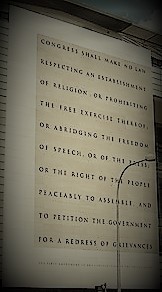Undermining Journalism Serves Trumps Narrow Legal and Political Goals; Apparently the First Amendment Isn’t Too High a Price for Him to Pay

Amidst all the drama in Washington, DC last week, the Trump administration launched another attack in its “long-running war” with the media. The White House implemented a change to its policies regarding ‘hard passes’ for journalists, revoking these clearances from many senior correspondents. This provocation is only the latest in a series of high-profile standoffs the president has created, as he routinely castigates the national media as biased and dishonest. That the administration deems this abuse necessary only shows how determined the president is to control the public conversation, but in the face of his bluster, journalists must continue accurately informing Americans and holding the White House accountable.
The rules change was announced in March but only received broader attention when Washington Post correspondent Dana Milbank wrote an op-ed last Wednesday announcing the revocation of his press pass. As he explained, the new policy requires hard pass holders to be at the White House “for at least 90 out of the previous 180 days — in other words, seven of every 10 workdays.” Given how few press briefings have occurred during Trump’s tenure, this is an unrealistic quota for any reporter. The loss of these passes does not bar a journalist from entering the White House, but rather requires them to apply for entry more regularly, whether daily, weekly, or biannually, whereas a hard pass lasts for two years. Many press corps members have been granted special exceptions, but this essentially means that these correspondents may lose their access for any reason at the discretion of Press Secretary Sarah Huckabee Sanders.
Some have warned in the past against overreacting to Trump’s attacks on the grounds that this provides the president with a welcome distraction from more substantive issues. This week, the White House might appreciate a break from coverage of Congress’s vote to hold Attorney General Bill Barr in contempt or the Senate Intelligence Committee Chair Richard Burr’s subpoena of Donald Trump Jr. Similarly, the temporary revocation of CNN correspondent Jim Acosta’s pass last November may have diverted attention from his controversial appointment of Acting Attorney General Matthew Whitaker or the consequences of the 2018 midterms.
Despite Trump’s attempts to distract the public and control the narrative by waging a war on the media, we simply cannot ignore the dangerous precedent he is setting for the role of the free press in our democracy. By dismissing credible reporting, painting news outlets as a threat, and even endangering the lives of journalists, he’s constantly undermining the free and independent press as one of our core democratic institutions. An informed, engaged public is vital to a functioning democracy. Journalists play a critical role in holding our elected officials accountable and providing the public with news and information to make informed decisions about our government. Trump’s war on the media poses a serious threat to our democracy. We must continue to denounce his attacks on the press to prevent it from becoming the new norm.
Trump’s war on the media must also not deter journalists from their responsibility to hold the administration to account – a job which is by definition adversarial. As New Yorker columnist Masha Gessen wrote following the revocation of Jim Acosta’s hard pass, “The White House is a lousy source of information about itself, but it is also the best available source.” The fact that Press Secretary Sanders has held so few briefings this year or that Trump has not held a press conference in nearly two years only proves that the administration prefers less public scrutiny. Other high-level officials are following the president’s lead, too. The Pentagon, which commands a nearly $700 billion annual budget has not held a formal press conference in almost a year. This is unacceptable in any circumstance, and only more so given the continuing breakdown in relations with countries like North Korea and Iran and the potentially catastrophic consequences of miscommunication or miscalculation on the part of the Trump administration.
Beyond physically confronting White House officials at scheduled meetings, journalists can continue to make incredible contributions to the public record through slower, more methodical investigative reporting. The NYT’s expose detailing the massive transfer of wealth from Fred Trump to his children repudiated the president’s claims of being a ‘self-made man’ and revealed potential criminal wrongdoing. Their recent report documenting ten years of Donald Trump’s tax returns indicate that even at the perceived height of his financial fortunes, his core businesses lost incredible amounts of money. Similarly, ProPublica and WNYC continue to shed light on possible corruption on the part of the president and his circle of friends and advisors through their open investigation, “Trump Inc.” These investigations avoid the daily outrage cycle, over which the president wields tremendous influence, and in so doing explore the stories that truly matter to the public.
Just because President Trump has politicized a free and independent press does not abrogate the right of the American people to understand what their elected officials are doing. While the press should not overemphasize personal fights with the White House in their coverage, nor can they cave to presidential bullying and so pave the way to more extreme malfeasance. Both in the press room and behind the scenes, the work of journalists must continue to shape and inform public opinion, the most powerful deterrent against governmental abuse of power.
See More: Media ConsolidationMedia & Democracy